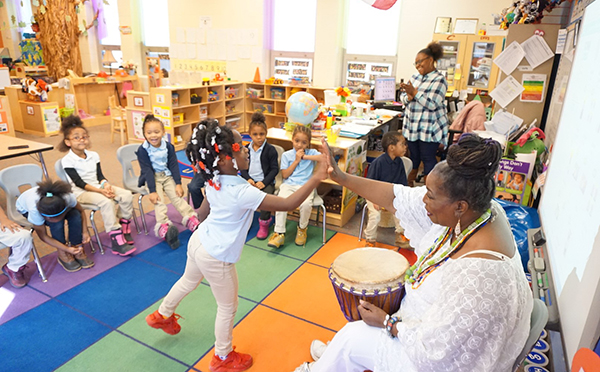- Home
- The MetroHealth Foundation
- Your Gifts At Work
- ArtsRx Program
Your Gifts At Work: MetroHealth Program 'Prescribes' Creative Expression as a Treatment for Loneliness

Future Ink Graphics (FIG) is a makerspace for professional, emerging and student graphic designers, and digital and silkscreen artists. The organization is one of the groups working with MetroHealth on the ArtsRX project.
Knowing the powerful impact engaging with the arts has on mental health and loneliness, The MetroHealth System’s Center for the Arts in Health launched ArtsRx, a pilot project that allows providers to “prescribe” arts activities and experiences for their patients.
The project, funded through a $16,578 ArtsNEXT grant from the Ohio Arts Council (OAC), links patients with opportunities for creative expression led by local artists and arts organizations.
When patients receive their “prescription for the arts” from their provider, they can participate in active engagement opportunities, like art and music making, writing and movement workshops; passive engagement experiences, such as viewing an art exhibit, listening to live music or attending a performance; or both. Patients can participate in as many activities as they would like during the pilot period, which runs through May 12. And it’s all free.
“When you ask someone about their past, so much of the meaningful experiences they share are often immersed in artistic pursuits,” said Eric Berko, PhD, a psychologist who works with MetroHealth’s Integrated Behavioral Health Team. “Things like singing in a choir; a dance class that helped them feel free to move their body; listening to music that soothes their soul; attending concerts or recitals. The existential loneliness we experience is reduced by shared experiences of beauty and connection: And that is the arts.”
Loneliness – like food insecurity, financial strain or a lack of reliable transportation – is a social condition that can inhibit a person’s chance for a healthy life. MetroHealth’s Institute for H.O.P.E.™ screens patients for these conditions, often referred to as social drivers of health, and connects them with community resources that can help. The Institute also develops initiatives to fill the needs existing programs can’t meet.
The ArtsRx pilot program is one those initiatives. Linda Jackson, Director of the Center for the Arts in Health, said the program is a response to the high levels of social isolation and stress seen in patients.
Last year, U.S. Surgeon General Vivek Murthy issued an advisory declaring social isolation and loneliness a public health crisis that increases the risk for premature death to more than 60% – as harmful as smoking 15 cigarettes a day. It’s linked to cardiovascular disease, hypertension, diabetes, dementia and suicide.
The crisis has been seen in MetroHealth’s own patient population, where 92% of the patients screened are shown to be at risk for social isolation. Those patients are more likely to screen at risk for other social drivers of health; 19% are more likely to experience depression, and 10% more likely to have issues with narcotics and other drugs. Women represent 67% of patients who screen at risk for social isolation.
How Does the Program Work?
Patients who receive their primary care at MetroHealth’s Old Brooklyn Medical Center, Ohio City Health Center and Main Campus are eligible to participate in the ArtRx pilot program if they screen as at risk for social isolation or are referred by an Integrated Behavioral Health provider.
After the “prescription for the arts” is written, a Community Health Worker contacts the patient and explains the program and the available opportunities.
The activities are hosted and led by MetroHealth’s partners, which include:
- FIG/Future Ink Graphics
- Inlet Dance Theatre
- Cleveland Museum of Art Community Arts Center
- Julia de Burgos Cultural Arts Center
- Cleveland Public Library
- Djapo Cultural Arts Institute
The activities all take place within the Clark-Fulton community at locations including PIVOT Center for Art, Dance and Expression; Julia de Burgos Cultural Arts Center; Cleveland Public Library’s South and Fulton branches; and The MetroHealth Glick Center.
At the end of the program, patients will be provided with information about how to continue engaging with the arts.
Social prescribing has been in use in the United Kingdom for 30 years and is considered a key component of the National Health Service’s strategy to combat loneliness there. It’s still a novel concept in the United States, but it’s a natural fit for MetroHealth’s innovative, forward-thinking approach to care and tackling the problems that challenge its community.
As with traditional prescriptions, the treatment is only as effective as the patient’s ability to afford or access it. All arts engagement activities prescribed are offered free of charge, and transportation is provided for patients who need it. This is possible through funding from the OAC, a state agency that funds and supports quality arts experiences to strengthen Ohio communities culturally, educationally and economically.
Your Generosity Means a Healthier Greater Cleveland
Support MetroHealth in its commitment to care for all.
Give to MetroHealth Today
